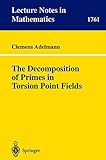The Decomposition of Primes in Torsion Point Fields [electronic resource] / edited by Clemens Adelmann.
Material type: TextSeries: Lecture Notes in Mathematics ; 1761Publisher: Berlin, Heidelberg : Springer Berlin Heidelberg, 2001Description: VIII, 148 p. online resourceContent type: text Media type: computer Carrier type: online resourceISBN: 9783540449492Subject(s): Mathematics | Geometry, algebraic | Number theory | Mathematics | Number Theory | Algebraic GeometryAdditional physical formats: Printed edition:: No titleDDC classification: 512.7 LOC classification: QA241-247.5Online resources: Click here to access online
TextSeries: Lecture Notes in Mathematics ; 1761Publisher: Berlin, Heidelberg : Springer Berlin Heidelberg, 2001Description: VIII, 148 p. online resourceContent type: text Media type: computer Carrier type: online resourceISBN: 9783540449492Subject(s): Mathematics | Geometry, algebraic | Number theory | Mathematics | Number Theory | Algebraic GeometryAdditional physical formats: Printed edition:: No titleDDC classification: 512.7 LOC classification: QA241-247.5Online resources: Click here to access online  E-BOOKS
E-BOOKS
| Current library | Home library | Call number | Materials specified | URL | Status | Date due | Barcode |
|---|---|---|---|---|---|---|---|
| IMSc Library | IMSc Library | Link to resource | Available | EBK1294 |
Introduction -- Decomposition laws -- Elliptic curves -- Elliptic modular curves -- Torsion point fields -- Invariants and resolvent polynomials -- Appendix: Invariants of elliptic modular curves; L-series coefficients a p; Fully decomposed prime numbers; Resolvent polynomials; Free resolution of the invariant algebra.
It is an historical goal of algebraic number theory to relate all algebraic extensionsofanumber?eldinauniquewaytostructuresthatareexclusively described in terms of the base ?eld. Suitable structures are the prime ideals of the ring of integers of the considered number ?eld. By examining the behaviouroftheprimeidealswhenembeddedintheextension?eld,su?cient information should be collected to distinguish the given extension from all other possible extension ?elds. The ring of integers O of an algebraic number ?eld k is a Dedekind ring. k Any non-zero ideal in O possesses therefore a decomposition into a product k of prime ideals in O which is unique up to permutations of the factors. This k decomposition generalizes the prime factor decomposition of numbers in Z Z. In order to keep the uniqueness of the factors, view has to be changed from elements of O to ideals of O . k k Given an extension K/k of algebraic number ?elds and a prime ideal p of O , the decomposition law of K/k describes the product decomposition of k the ideal generated by p in O and names its characteristic quantities, i. e. K the number of di?erent prime ideal factors, their respective inertial degrees, and their respective rami?cation indices. Whenlookingatdecompositionlaws,weshouldinitiallyrestrictourselves to Galois extensions. This special case already o?ers quite a few di?culties.


There are no comments on this title.